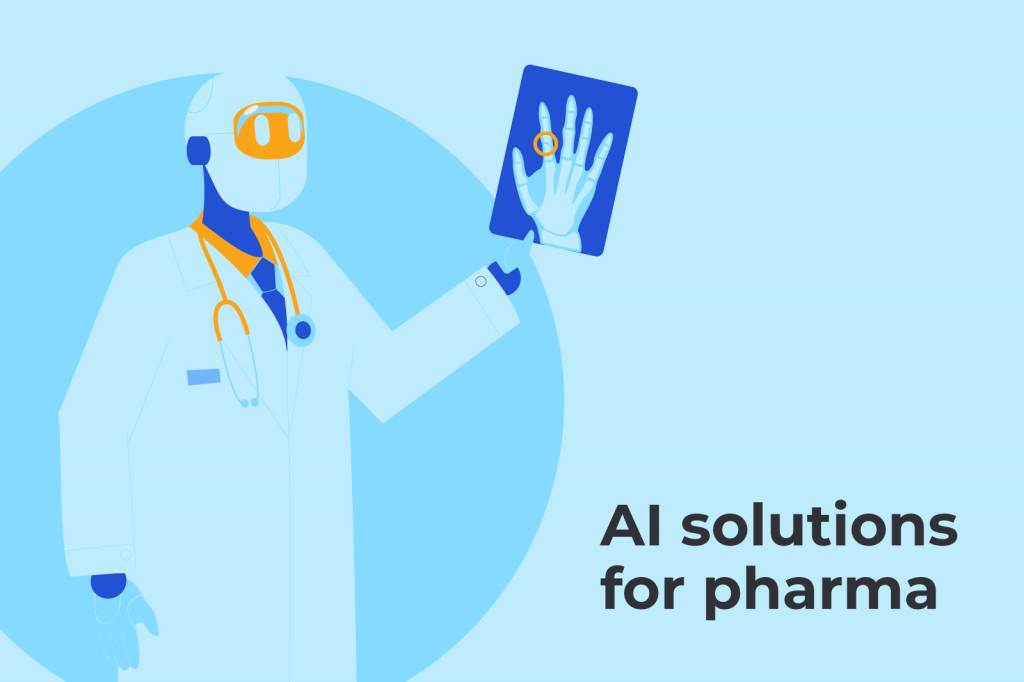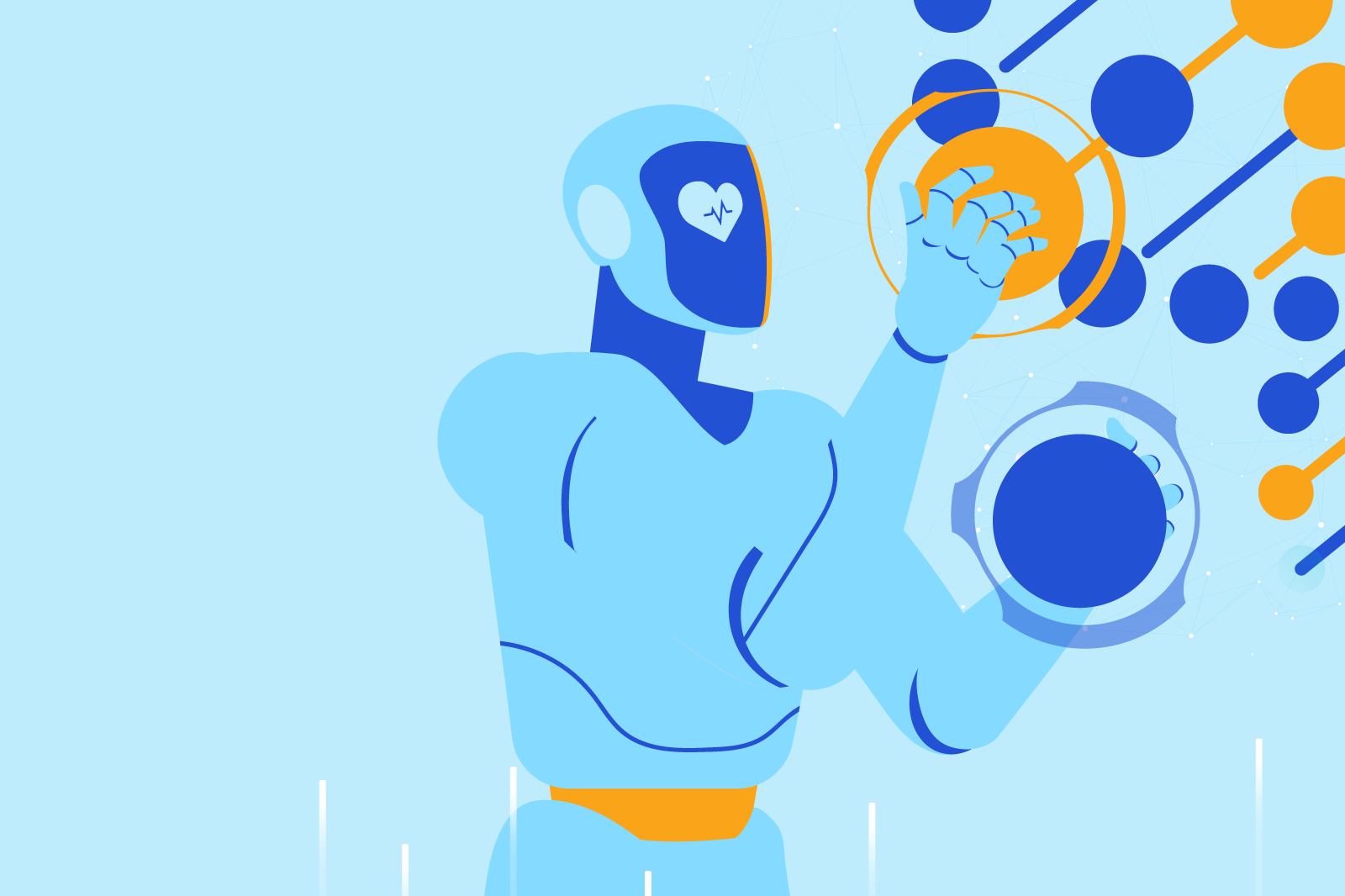
AI solutions for pharma
In our previous articles, we discussed AI's impact on various industries. Still, given our history in developing software solutions for the pharmaceutical industry, we decided to examine how AI is transforming it.
AI and generative AI for pharma are reshaping how the industry works. That’s because drug/pharmaceutical companies can also be considered data companies. Luckily for them, AI is extremely good at managing immense amounts of data, which will mean that more lives can be saved with AI.
What are some current AI solutions for pharma companies?
AI is already used in pharma companies to automate tasks and help discover new drugs. Here are some real-world AI solutions for pharma:
AI medical document translation and processing
Natural language processing solutions tailored for the pharmaceutical industry by embedding pharmaceutical terminology can translate medical documents into multiple languages. This is extremely helpful, especially when you need to release a new drug in an international market—AI can manage such tasks with ease and increased velocity.
Furthermore, they can be used for translation and as research assistants by performing literature searches, creating summaries, and reviewing documents, which frees up a lot of time in administrative tasks.
AI-enhanced drug discovery
Drug discovery was universally a laborious and expensive process, but now, AI is being used to screen millions of compounds to identify the best drug candidates. The entire process is being transformed as it becomes much faster, less expensive, and more efficient. Because of its high processing nature, AI systems can test an almost infinite number of possibilities, where traditionally, it could take years or even decades to find a suitable drug compound.
True Personalized Medicine with AI
Personalization is a hot topic in many industries, and in medicine, it might become the new standard with the use of AI. Tailored AI for pharmaceutical solutions can find the patients most likely to respond positively to a particular drug. This has significant benefits, as it improves patient outcomes and reduces the risk of side effects.
Much improved drug safety with AI
Traditionally, much research and time (years, even decades) were needed to test the effectiveness of a particular drug. Given the logistical limitations, conducting studies on many people was also challenging. Nowadays, AI can process and interpret data from electronic health records or other relevant sources to determine the effectiveness of drugs. AI has the potential to make drugs safer and more effective.
New imaging capabilities with AI
AI is also being used to improve and make early diagnoses. For example, new imaging techniques are being created that can detect cancer at early stages or even predict which persons are more likely to develop such diseases and what the estimated time frame is. AI systems can read, interpret, and make predictions based on data from medical records, but not just them—data from health and fitness apps, sleep monitoring apps, and more can be used to increase diagnosis and treatment efficiency.
What are the main benefits of AI services for pharma companies?
Yes, we know everything above looks like excellent benefits, but some others are solely related to pharma companies from the business perspective:
Enhanced cost reduction with AI
From less administrative time needed to faster drug discovery, AI is reshaping the pharmaceutical industry paradigm as it becomes less expensive. There are numerous other ways in which AI can reduce costs. For example, researchers developed a more effective program for patients with chronic diseases using AI in a specific use case. Thus, they are not as reliant on hospital facilities and personnel.
Much improved efficiency
Almost every process “touched” by AI becomes more efficient—either in speed or accuracy and, in most cases, in both. With the potential to automate most repetitive tasks to free up time and have a huge impact on research and development, it’s no surprise that AI can improve the efficiency of the entire pharmaceutical industry.

The challenges of AI in pharma
One of the biggest challenges is the fear of many in the field of being replaced by AI. The reality is that AI will most likely put more pressure on researchers and scientists because they will need to achieve more in less time. Sequentially, they will have more time for complex tasks, which implies a shift in the roles and job descriptions.
Most anticipate that AI will work with healthcare personnel rather than replace them. However, that, in turn, implies that people need to acquire new skills to use AI most effectively, so specific training programs will mainly be required.
Furthermore, even though the temptation of overusing AI might become hard to ignore, people will need to focus on developing skills that are hard to replace or outbeaten by AI in the foreseeable future.
What does the future of AI in pharma might look like?
Big health data
According to a report from PwC, more data from multiple disciplines within the pharma industry will be generated as the industry evolves. In time, this data will become “big health data.” This and predictive analytics will be pivotal changes in the industry as they will act as a foundation for critical decision-making. AI will identify patients most likely to develop certain conditions by recognizing patterns, analyzing lifestyle and environmental factors, and even personalizing treatment based on these factors.
Better predictions for drug development
While processing power and data sets will improve, the quality of the predictions in algorithms around molecules will, too, thus generating faster and more efficient drugs.
Scientists can already make predictions of large molecules, such as antibodies or RNA-based treatments using AI - so the potential is immense. Researchers will also be able to act faster against biological threats, such as developing vaccines for newly discovered ones.
Conclusion - AI solutions for pharma
Though we’re still in the early stages, AI truly impacts the pharma and healthcare industry. Even though it might pose some risks, such as ethical issues, patient data protection, and potential role restructuring, its gains are tremendous. They could bring in a new era of medical advancements and innovation. The real game-changing thing about AI right now is its power to work with vast amounts of data, analyze it, and make fundamental predictions in drug development.
Are you looking to embed AI into the processes of your pharma/healthcare company?
We at Ontegra have extensive expertise in developing tailored software solutions for the pharmaceutical and healthcare industry, with many complex solutions under our belt. We also have our very own AI software development department, which works hand in hand with the rest of our teams to find the best ways to include AI efficiently. Want to find out more and get a personalized quote for your project? Please leave us a message.
Article written by Iulia Filimon, NLP Engineer
Iulia designs and develops algorithms and models that enable computers to understand, interpret, and generate human language. She participates in building the first innovative AI company's solutions and exposing them to clients.